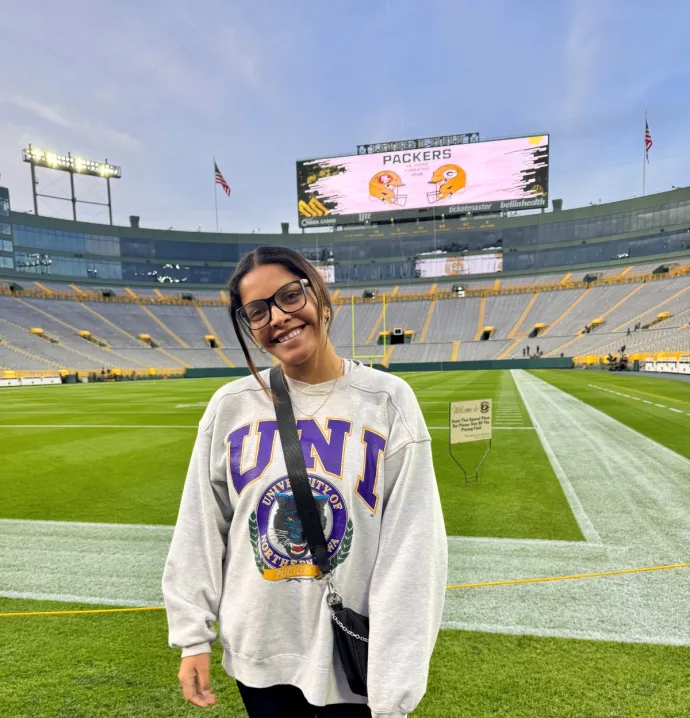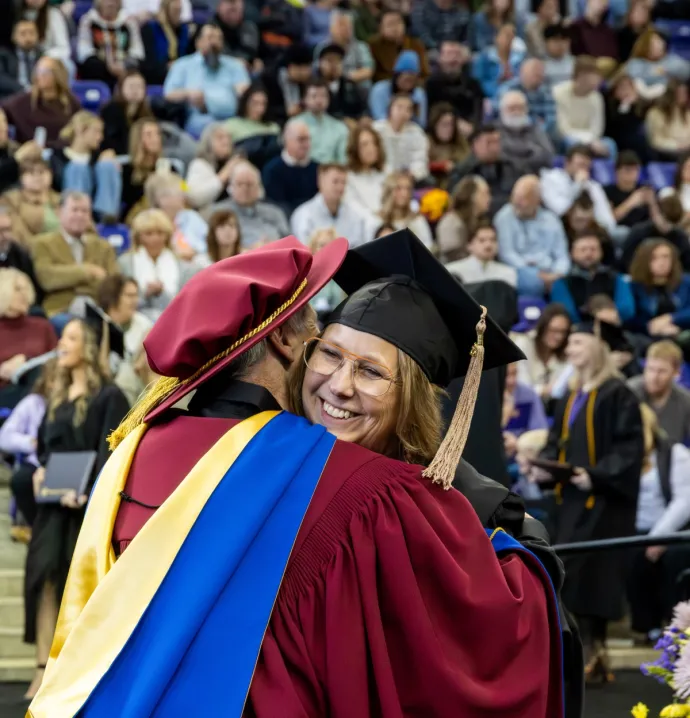UNI alum Jane Elliott reflects on legacy of anti-racist work
UNI alum Jane Elliott reflects on legacy of anti-racist work
Now 86 and living on a remote green patch of Northern Iowa countryside, famed anti-racist and University of Northern Iowa alumna Jane Elliott may seem an unlikely candidate for viral videos and social media clout.
But in just the last two weeks, the socially conscious Atlanta rapper T.I. dubbed her “My Hero” on his Instagram feed, Jimmy Fallon invited her on “The Tonight Show” and videos of old interviews she’s given have received millions of views as Elliott is rediscovered by a young generation eager for change. Killer Mike, the RTJ rapper whose speech to Atlanta protesters went viral earlier this month, recommended her teachings to all white Americans during a recent appearance on “The Late Show with Steven Colbert.”
“She’s not just speaking, but she’s teaching people about the racism that’s given to them that they aren’t even aware they have,” Killer Mike told Colbert. “So my homework for all of white America, including you, is to spend an hour learning from Jane Elliott on YouTube tonight.”
America, roiled by the horrific death of George Floyd and seemingly fed up with society’s enduring racism, may at last have caught up with Elliott’s once-radical ideas. She’s been doing three or four media interviews a day in recent weeks - spreading her message that there is only one, human race and that the US must dismantle its racist structures and myths before real progress can occur.
“I’m wearing myself out - but I’d rather wear out than rust out,” Elliott told InsideUNI in an interview at her home last week, wearing a white sweatshirt with the Nathan Rutstein quote ‘Prejudice is an emotional commitment to ignorance.’
“We thought we stopped Martin Luther King Jr.’s dream by killing him, but his dream is more alive now than it was when he was living,” she said. “And we have proof of it by what's going on in every major city in the United States of America right now.
“No power on earth is going to be able to stop the idea of one race, the human race - no power on earth is going to be able to stop that, because that's the truth,” she said. “Racism isn't about skin color. It's about white fear of different kinds of people. That's the problem. You can't change skin color. You can change attitudes.”
It was the 1968 assassination of MLK, Jr. that galvanized Elliott. She was then a third-grade teacher in Riceville, a small town about 70 miles north of Cedar Falls. Elliott’s class was in the middle of “Heroes Week” and King was one of the heroes they planned to celebrate.
The slaying still makes Elliott emotional. “There’s no words to describe how I felt at the moment,” she said. Just talking about what happened wasn’t enough, Elliott felt. She wanted her students to get a glimpse of what it was like to be black in America.
Thus was born one of the more famous social studies exercises ever done in the US, one that is still widely taught. She’s been listed on a timeline of key educators along with Aristotle, Booker T. Washington, Confucius, Plato, Maria Montessori by textbook publisher McGraw-Hill, according to a 2005 profile of Elliott in Smithsonian Magazine.
That next day, Elliott asked her students if they wanted to be part of an exercise to help them understand what it was like for African-Americans in the US. She then informed them that brown-eyed people were smarter, cleaner and harder-working than blue-eyed people because their eyes had more melanin.
The response was nearly immediate, Elliott recalls. A brown-eyed girl questioned why they needed to listen to a blue-eyed teacher. The “superior” students began to berate their blue-eyed classmates.
A week later, Elliott had the class switch roles and the blue-eyes playing the “superior” role. She was surprised to note that these students treated their classmates more humanely after having been discriminated against.
The students were asked to write about their experiences. As word of the experiment spread, the local newspaper printed some of the students' papers. The news was quickly picked up in outlets all over the country. Johnny Carson flew her out to New York City to be on “The Tonight Show.”
But her exercise was widely condemned in Riceville, where she and her family were labeled “n-word lovers.” Townspeople boycotted her mother’s hotel and restaurant, which soon closed. Elliott, her husband and their four children moved to another town after the children were attacked in school, she said.
It was during this time that Elliott, who had graduated from UNI with a teaching certificate, returned to get her degree. She said the university provided an important foundation for her teaching career, particularly teaching her about active learning and placing her with a school principal in Independence for her student teaching.
“I am so grateful for UNI,” she said. “I learned so much...I was one of the first ones that went out of town to do their student teaching. That was the best thing that could possibly have happened to me. It was absolutely wonderful.”
Elliott is held in high regard at UNI, which awarded her an honorary doctorate degree in recent years.
“She is a legendary figure,” said education professor Shuaib Meacham. “Her blue-eyed/brown-eyed experiment … it really is, no pun intended, eye-opening. I’ve used it in my class. In general, students aren’t aware of her work, they aren’t aware that she’s from Iowa — and I didn’t even know she was a graduate of UNI. But to me, that’s a UNI story that should be celebrated and used to help guide us moving forward into the future.”
Much of Elliott’s work has also been on education reforms - she has long advocated for changes in what students are taught as a way to help dismantle a system built on a myth of white superiority.
“Any white person who was born, raised and schooled in the United States of America - if you aren’t a racist you’re a miracle. Either that, or you decided to educate yourself,” Elliott says in one of the old videos that has gone viral recently. “Because education in this country is about white is right...we educate in a way that says white males have done all the adventures, have done all the discovering.
“It’s a lie, but we do that in order to maintain the myth of white superiority. The myth of race has to be maintained at all costs in this county,” she said. “Because if white people have to give up the color of their skin as being something that makes them perfect - what do they have left? If we start teaching the truth about history, if we start teaching about Nile Valley contributions to civilization it will totally change the way we conduct ourselves in the classroom.”
Such statements have long provoked discussion - and backlash. Two documentaries were made about her work and in 1985 Elliott left teaching to do training full-time at corporations and universities around the world. She appeared on the Oprah Winfrey show several times and even there the exercise drew strong reactions from blue-eyed people unaccustomed to being discriminated against.
“I’ve been threatened with death lots of times,” Elliott said, recalling once being spirited out of Uniontown, Pennsylvania after teachers vowed to attack her after a training exercise she’d conducted there. “I've been hit by a white adult male during this exercise. I've had a knife pulled on me.”
Elliott also has no patience for sanctimony and pretense.
“Liberal females come up to me and say things like, ‘I don’t see color; I don’t see people as black or brown or red,’” she said. “And I say, you know, I knew you were colorblind before you said it, because if you weren't colorblind, you wouldn't wear that shirt with those pants.’
“And they get offended - How dare I say such a thing to them? And I say, ‘Look fool, you have offended me by telling me that you don't see the largest organ on my body, which is my skin.’
“People do see color. What we have to do is say it's all right to see color, just don't see it as a negative. Give up that part of your psychology or your philosophy or your education.”
When Killer Mike, who previously invited her to visit his Atlanta barbershop and to watch him perform at Coachella, shared her name on national TV, Elliott grew a little worried about being targeted by white supremacists. But she won’t be deterred.
“Mike don’t say that,” she said, laughing. “You know, that's asking for trouble. So now I lock my doors tightly every night and I check my windows because I know. There's not a doubt in my mind, but somebody is gonna try to take me out.
“And I say publicly, go ahead. My husband died almost seven years ago, and my oldest son died two years ago. You think you can hurt me? You think you can scare me? You think death is the worst thing that can happen to me? No, you living a useless life is the worst thing that can happen to you. And I will not stop what I'm doing because I'm afraid. I'm not afraid anymore so go for it.”




